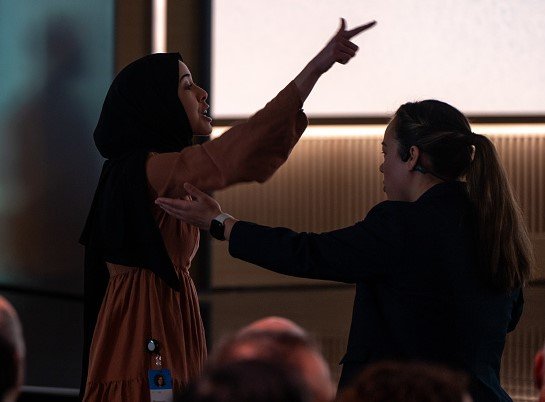A dramatic interruption during Microsoft’s 50th-anniversary event has snowballed into firings, public scrutiny, and rising internal tensions at one of the world’s most influential tech firms.
Two employees were dismissed following a protest against Microsoft’s involvement with the Israeli military—an action that’s now sparking fierce debate about corporate responsibility, free speech at the workplace, and the role of tech in global conflicts.
Pro-Palestinian Protest Halts Microsoft AI Event
The protest took place on April 4 at Microsoft headquarters in Redmond, Washington, during a high-profile event marking half a century since the company’s founding. The celebration wasn’t just nostalgic—it was also forward-looking, with Microsoft AI CEO Mustafa Suleyman showcasing the company’s latest AI features, including its Copilot platform.
Microsoft software engineer Ibtihal Aboussad stormed the stage, calling out the company’s alleged complicity in the ongoing war in Gaza. “You claim that you care about using AI for good,” she said, “but Microsoft sells AI weapons to the Israeli military.” Security quickly removed her from the premises, but not before her comments echoed throughout the livestream.
Termination Letters, Instant Backlash
By Monday, Microsoft had taken formal action. A letter was delivered to Aboussad, stating that her behavior was intended to “gain notoriety and cause maximum disruption.” She was fired immediately.

Another employee who had also been protesting Microsoft’s ties to the Israeli military—and had recently tendered her resignation—was dismissed five days early.
Both were affiliated with the group MSFT Workers for Palestine, which has been quietly organizing inside the company for months. That group confirmed the terminations in a public statement, saying the company’s response was “retaliatory” and aimed at silencing dissent.
One paragraph in the firing letter reportedly accused Aboussad of premeditated misconduct. The message, workers say, was loud and clear: dissent won’t be tolerated—especially onstage.
Microsoft’s Ties to the Israeli Military Under Fire
The protest comes amid growing criticism of tech companies’ involvement in military projects, especially those connected to the Israel Defense Forces (IDF).
Microsoft has a multi-year contract with the Israeli government and military, which includes AI-powered cloud services and cybersecurity solutions. While Microsoft hasn’t publicly detailed all of its defense-related partnerships, internal documents and external reports have pointed to a long-running relationship with the Israeli public sector.
The MSFT Workers for Palestine group claims that the company’s AI tools are being used in military operations, including drone surveillance and predictive targeting. Microsoft has not confirmed these claims.
Here’s what’s known:
-
Microsoft signed a contract with the Israeli government in 2022 for cloud infrastructure via its Azure platform.
-
The deal was valued at approximately $1.8 billion, according to Israeli media reports.
-
Employees have repeatedly petitioned leadership for more transparency about how its technology is being used in conflict zones.
Tensions Rising Inside Microsoft
The firings are just the latest flashpoint in what’s become a deepening rift inside the company.
Since the war in Gaza escalated in late 2023, a number of Microsoft employees have called on the company to denounce violence and review its military contracts. But top leadership has largely stayed quiet, offering generic statements about peace and inclusivity.
Privately, several employees say they feel betrayed. Some shared anonymous statements with news outlets claiming the company is “turning a blind eye” to ethical concerns. Others fear retaliation if they speak out.
“You’re either complicit or you’re out,” one anonymous engineer told a local reporter. “There’s no middle ground anymore.”
The Broader Context: Gaza, Israel, and the War
The backdrop to this controversy is the ongoing war in Gaza, which began after the brutal October 7, 2023 attack by Hamas-led militants on southern Israel. That massacre left roughly 1,200 Israelis dead and over 250 taken hostage.
In response, Israel launched an extensive military operation in Gaza. As of early April 2025, the Gaza Health Ministry, which is controlled by Hamas, claims over 50,000 people have died—a number that includes both civilians and combatants but remains unverifiable.
The situation on the ground is dire. Aid groups report massive humanitarian crises, hospitals running out of supplies, and entire neighborhoods flattened.
In the face of that, American tech companies—particularly those with defense contracts—are under renewed scrutiny.
Free Speech or Corporate Sabotage?
The firings raise complex questions. How much freedom do workers have to protest company policy? Does speech become misconduct when it disrupts a staged event? Or is silencing workers an abuse of corporate power?
“There’s no constitutional right to protest at work,” said labor law attorney Kendra Soto in an interview. “But when the issue involves ethics, international conflict, or human rights, these lines get blurry fast.”
Tech companies like Google and Amazon have also dealt with worker protests over their ties to Israel and other governments. In some cases, internal activism has led to the cancellation of controversial projects—like Google’s Project Maven in 2018.








